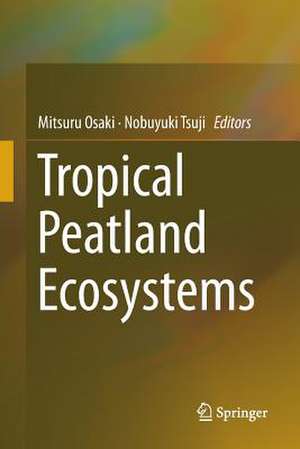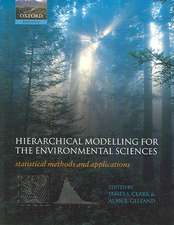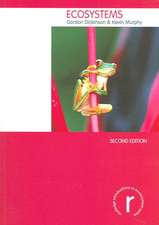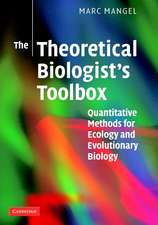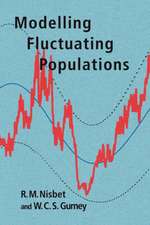Tropical Peatland Ecosystems
Editat de Mitsuru Osaki, Nobuyuki Tsujien Limba Engleză Paperback – 29 mar 2019
| Toate formatele și edițiile | Preț | Express |
|---|---|---|
| Paperback (1) | 1128.46 lei 6-8 săpt. | |
| Springer – 29 mar 2019 | 1128.46 lei 6-8 săpt. | |
| Hardback (1) | 1481.95 lei 6-8 săpt. | |
| Springer – 16 dec 2015 | 1481.95 lei 6-8 săpt. |
Preț: 1128.46 lei
Preț vechi: 1376.17 lei
-18% Nou
Puncte Express: 1693
Preț estimativ în valută:
215.93€ • 226.02$ • 179.72£
215.93€ • 226.02$ • 179.72£
Carte tipărită la comandă
Livrare economică 31 martie-14 aprilie
Preluare comenzi: 021 569.72.76
Specificații
ISBN-13: 9784431566755
ISBN-10: 4431566759
Pagini: 651
Ilustrații: XIII, 651 p. 250 illus., 182 illus. in color.
Dimensiuni: 155 x 235 mm
Greutate: 1.01 kg
Ediția:Softcover reprint of the original 1st ed. 2016
Editura: Springer
Colecția Springer
Locul publicării:Tokyo, Japan
ISBN-10: 4431566759
Pagini: 651
Ilustrații: XIII, 651 p. 250 illus., 182 illus. in color.
Dimensiuni: 155 x 235 mm
Greutate: 1.01 kg
Ediția:Softcover reprint of the original 1st ed. 2016
Editura: Springer
Colecția Springer
Locul publicării:Tokyo, Japan
Cuprins
Tropical Peatland of the World.- Changing Paradigms in the History of Tropical Peatland Research.- Peatland in Indonesia.- Peatland in Malaysia.- Peatland and Peatland Forest in Brunei Darussalam.- Peatland in Kalimantan.- Sustainable Management Model for Peatland Ecosystems in the Riau, Sumatra.- Tropical Peat Formation.- Tropical Peat and Peatland Definition in Indonesia.- Forest Structure and Productivity of Tropical Heath and Peatland Forests.- Floristic Diversity in the Peatland Ecosystems of Central Kalimantan.- Peat-fire Impact on Forest Structure in Peatland of Central Kalimantan.- A Comparative Zoogeographic View on the Animal Biodiversity of Indonesia and Japan.- Aquatic Communities in Peatland of Central Kalimantan.- Mycorrhizal Fungi in Peatland.- Characteristics of Watershed in Central Kalimantan.- Groundwater in Peatland.- Peat Fire Impact on Water Quality and Organic Matter in Peat Soil.- Discharged Sulfuric Acid from Peatland to River System.- Arrangement and Structure of Weirs on the Kalampangan Canal.- CO2 Balance of Tropical Peat Ecosystems.- Methane and Nitrous Oxide Emissions from Tropical Peat Soil.- Carbon Stock Estimate.- Evaluation of Disturbed Peatland/Forest CO2 Emissions by Atmospheric Concentration Measurements.- Peat Fire Occurence.- Detection and Prediction Systems of Peat-Forest Fires in Central Kalimantan.- Compact Firefighting System for Villages and Water Resources for Firefighting in Peatland Area of Central Kalimantan.- Contribution of Hyperspectral Applications to Tropical Peatland Ecosystem Monitoring.- Land Change Analysis from 2000 to 2004 in Peatland of Central Kalimantan, Indonesia Using GIS and an Extended Transition Matrix.- Estimation Model of Ground Water Table at Peatland in Central Kalimantan, Indonesia.- Peat Mapping.- Modeling of Carbon and GHG Budgets in Tropical Peatland.- Field Data Transmission System SESA-II, by Universal Mobile Telecommunication Network.- Peatland Management for Sustainable Agriculture.- Tropical Peatland Forestry: Toward Forest Restoration and Sustainable use of Wood Resources in Degraded Peatland.- Ethnic Plant Resources in Central Kalimantan.- Local Community Safeguard by REDD+ and Payment for Ecosystem Services (PES) in Peatland.- Carbon Credit Current Trend and REDD-plus Projects.- The Potential for REDD+ in Peatland of Central Kalimantan, Indonesia.- Livelihood Strategies of Transmigrant Farmers in Peatland of Central Kalimantan.- Sustainability Education and Capacity Building in the Central Kalimantan, Indonesia.
Textul de pe ultima copertă
This book is an excellent resource for scientists, political decision makers, and students interested in the impact of peatlands on climate change and ecosystem function, containing a plethora of recent research results such as monitoring-sensing-modeling for carbon–water flux/storage, biodiversity, and peatland management in tropical regions. It is estimated that more than 23 million hectares (62 %) of the total global tropical peatland area are located in Southeast Asia, in lowland or coastal areas of East Sumatra, Kalimantan, West Papua, Papua New Guinea, Brunei, Peninsular Malaysia, Sabah, Sarawak, and Southeast Thailand. Tropical peatland has a vital carbon–water storage function and is host to a huge diversity of plant and animal species. Peatland ecosystems are extremely vulnerable to climate change and the impacts of human activities such as logging, drainage, and conversion to agricultural land. In Southeast Asia, severe episodic droughts associated with the El Niño-Southern Oscillation, in combination with over-drainage, forest degradation, and land-use changes, have caused widespread peatland fires and microbial peat oxidation. Indonesia's 20 Mha peatland area is estimated to include about 45–55 GtC of carbon stocks. As a result of land use and development, Indonesia is the third largest emitter of greenhouse gases (2–3 Gtons carbon dioxide equivalent per year), 80 % of which is due to deforestation and peatland loss. Thus, tropical peatlands are key ecosystems in terms of the carbon–water cycle and climate change.
Caracteristici
Provides a review of tropical peatland in Southeast Asia Discusses the carbon–water cycle, biodiversity and monitoring-sensing-modeling on carbon flux and storage Furnishes a good introduction to sustainable peatland management
